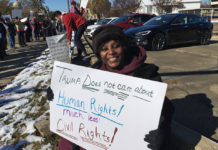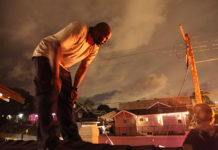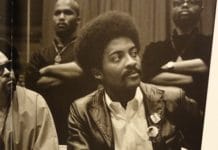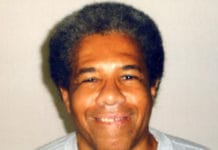Interview with filmmaker Cleveland Bailey Jr.
by Leroy Moore
Cleve Bailey has taken the story of his great uncle and aunt, George and Kathy Eames, and created a screenplay entitled “A Small Temporary Inconvenience,” which chronicles the lives of this interracial couple who dedicated their lives to civil rights activism and fighting against racism in the Deep South.

Kathy Andre-Eames, an author in her own right, has written a fascinating book entitled “Warrior for Justice: The George Eames Story.” It’s a biography and autobiography about her interracial marriage to a charismatic paraplegic Black man who was the NAACP president for many years in Baton Rouge, Louisiana, during the Jim Crow era.
It’s the tale of forbidden interracial love, civil rights struggles, the Klan and the integration of the Louisiana State University sports programs. The book also features original poetry from Mrs. Eames, who is also a published poet. It’s a great read.
Cleve Bailey has fashioned his story in large part on his aunt’s book. As writer-director, Cleve is excited to bring this compelling civil rights story to the big screen. I caught up with Cleve, who now lives in the Bay Area in Hayward, to get his take on the film project.
LM: What’s the title of the movie again?
CB: “A Small Temporary Inconvenience”
LM: The book title and the movie title are different; why is that?
CB: Whenever my uncle heard a sad story, he would tell the person, “This is just a small, temporary inconvenience.” Since that was one of his favorite sayings, I thought it represented what he would want to leave humanity. If anything bad happens to you, it will pass. Just give it time.
LM: You’re originally from Louisiana; is that right?
CB: I am. I am from Baton Rouge, the Red Stick. Yeah, it was a great place to grow up. You don’t realize the historical significance of the place where you’re born until you grow up.
And then you realize that we have the best football players, we have the best basketball players, we have the best looking women (laugh) – and some of the best food. We have a very rich history. It’s crazy, you know – the Civil Rights movement, Jim Crow, slavery and, of course, football.
A lot of our history in the South is about the African American experience. People from other regions have a tendency to think that it’s all doom and gloom. But there was a whole lot of love and support in my community, and I’m proud of that. I actually enjoyed growing up in the South very much.
LM: I know for me, being a music lover and being a Blues lover, the South has so much history with the Blues.
CB: Right, right. It’s a very creative environment, certainly with music, but also in so many other ways – from the African-American minister and the way he puts on his show to the way we cook and season our food.
LM: You know I’m a Black, disabled researcher, journalist and activist. So when I found the story of George Washington Eames Jr., I had to get the book. The story is definitely important for the Black community and the disabled community. Tell us about your movie project. How will the film inspire people, especially those who are disabled or disenfranchised?
CB: That’s a very good question. I think the movie will say to the disabled, the disenfranchised or to anyone that you can get power from pain. It just depends on how you decide to process what’s happening to you and what you choose to do with it.
I think my Uncle George, who was shot in the back by a white man who mistook him for someone else, was so mad about what happened to him that he was willing to risk his life to make sure that it never happened to anybody else. We all get outraged when this sort of thing happens to our young men; for example, more recently Oscar Grant and Trayvon Martin became national news stories.
What happened to them was tragic and inexcusable. Who knows what these young men may have accomplished if they lived.
I think the movie will say to the disabled, the disenfranchised or to anyone that you can get power from pain. It just depends on how you decide to process what’s happening to you and what you choose to do with it.
My Uncle George did live. He joined the NAACP and worked his way up to chapter president. Then he went after the lawmakers and the institutions that promoted racism and the Jim Crow culture that was oppressing a whole race of people.
He pressed for social justice with unbridled passion and courage. And because of his tenacity, he rose to become a civil rights and American hero while in a wheelchair as a paraplegic. He is a legend in Louisiana.
So I think the biggest thing that people can learn from the book and the movie is power from pain. As long as you have your mind and your voice and you choose to serve, you can get respect and you can improve your community and ultimately the world.
LM: You know, there’s a lot of ups and downs in the book, like interracial marriage back in the ‘60s and George getting shot in a white neighborhood. He was disabled and put in prison. Give us some background on these times and how the film would bring some of these issues to the big screen.
CB: It’s a period piece. The film is set primarily in the 1970s but these issues are still ongoing today. Racism still exists, but despite the tragic incidents that we read about all too often, I believe it’s getting better.
As people are more and more educated and old ways are challenged, a growing sector of society views racism as abhorrent. Obviously, my Uncle George represents any Black male in America who happens to be in the wrong place at the wrong time.

Uncle George didn’t get shot for something he did. He got shot for something someone else did. They couldn’t get a good description of the perpetrator, so it’s any Black male, Uncle George.
And after this white guy shot him, my uncle lay in a dirty alley for two hours before the ambulance came – that’s racism again. What white guy would lie in an alley for two hours?
Somehow, by the grace of God, he lived and was able to find strength and power in his disability. From his wheelchair, he worked with the NAACP and helped improve that community for everybody.
In terms of the interracial marriage, you know, everybody I talk to says they couldn’t understand how this pretty, educated white girl whose father was in the Southern Gentlemen’s Association, a segregationist group, could fall for a big mouth, radical, paraplegic Black man.
I’ve come to realize that my Aunt Kathy has a heart filled with pure love; but she told me Uncle George was the most charismatic person that she had ever met, and it was an almost instant attraction. For them, the content of their character was much more important than the color of their skin.
And then it goes even deeper. Kathy lost her relationship with her father over her decision to do what she knew in her heart was right for her. So the broader question is, when do we question the values of our family, society and culture? Change happens slowly, but as a man once said “the moral arc of the universe is long, but it bends toward justice.”
LM: Deep.
CB: I think that God works in mysterious ways and that he gives us what we need. If something is taken from us, he will replace it with something better.
We don’t need to be afraid in this life about social barriers and social change and those kinds of things. I think that God’s ultimate plan is to have human beings work through all of the hate and fear that drives so much misery and pain in the world. We should see people for who they are, not separate them based on some physical attribute such as color or whatever the case may be.
LM: Thank you Cleve. Very important topics. Why are you so confident this film will be made?
CB: Well, several reasons. First and foremost, I think that the Black voices of America are getting a chance to be seen and heard. There are so many stories about African American men and women who showed bravery and courage under fire.
People who showed great character and moral strength have not had a chance to be seen on the big screen because there were not enough Black people who were in the feature film production business. Now that the reigns of film and television have loosened up, I think this type of story can inspire a whole new generation of leaders.
Even the disabled can be like George Washington Eames, president of the NAACP, a leader, an agent for change. Heretofore, when many white writers and directors portrayed us, they portrayed us as step-n-fetch it, an Aunt Jemima or the buffoon. We were always the first to die in their films, and we seldom got a chance to be strong Black people in the center of our own narrative, driving our story, making decisions, being the hero.
I think that the Black voices of America are getting a chance to be seen and heard. There are so many stories about African American men and women who showed bravery and courage under fire.
I think in today’s society, people are tired of seeing those old images of Black people, and they want to see people who are more like people that they know or love: the great football stars with their stories, the great preachers with their stories, the Civil Rights heroes; the list goes on and on.
How did we go from slavery to having a Black president in this country in only 60 years of voting? There’s a ton of new story ground to cover, and I feel blessed to be a filmmaker in these changing times.
These are the types of stories minority and majority groups want to see today. “Gone with the Wind” and all of that old stuff has had its day; now it’s time for new leading men and new leading ladies. With increased outlets you can watch films on television, on your phone, everywhere and anywhere, almost. So we need more and more content to keep the audiences engaged.
That being said, the door is open for stories like these that are important but have never been told because African-Americans didn’t have access to getting their stories out and getting their stories financed. I think that the golden age of African-American cinema is about to begin, or it has begun.
And we’re gonna see more and more compelling and interesting stories about African-American people, their hopes, fears and courage. I can’t tell you about the jail part because I want everyone to go and see the movie. I can’t give it all away (laugh).
LM: Thank you for this interview. I know for me, growing up as a Black, disabled boy in the ‘70s, I didn’t see myself on the screen until “Porgy and Bess,” you know? So yeah, it definitely needs to be available in the marketplace, especially for Black, disabled youth growing up now.
CB: Right. And I think additionally, when you grow up and you realize what your race had to go through and how they were not allowed to learn how to read and write, how they were not allowed to own property but had their families ripped apart, you can understand some of the chaos that we see in our communities today. I think these positive images of us overcoming obstacles and pushing successfully into areas where inclusion and achievement are our goals send important messages and images for our young and old people to see.
LM: Mr. Bailey, it’s been a pleasure talking to you. Good luck with your project and come visit us any time.
CB: Thank you, Leroy. It’s been my pleasure.
Leroy F. Moore Jr., poet, researcher, journalist and activist and founder of Krip-Hop Nation, can be reached at Kriphopnation@gmail.com.

 Store
Store








